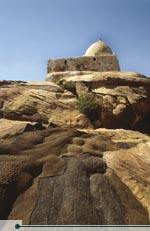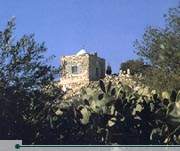 |
Keys
to the Kingdom National Anthem The Office Touristic Sites |
| Jordan
has been blessed with a rich religious history. Located between Mecca al-Mukarrama, the
holiest place on earth for Muslims, and al-Quds (Jerusalem), which is sacred to each of
the three great monotheistic religions, Jordan has played a central role in the history of
the ahl al-Kitab (People of the Book). The land around the Jordan River Valley and the Dead Sea plain is revered by Muslims, Christians and Jews as blessed. The Bible calls it "the Garden of the Lord" (Genesis 13: 10), and the Holy Qur’an says that God blessed the land "for all beings." Indeed, half of humanity views the land and the river of Jordan as the geographic and spiritual heartland of their faith. |
 Shrine of the Prophet Haroun (Aaron) overlooking Petra the Nabatean capital. © Ammar Khammash |
| The
southern Jordan River Valley, the Dead Sea plains, and the surrounding hills and mountains
are the home for some of the most momentous events in the history of man’s
relationship with God. Here Prophet Ibrahim (Abraham) arrived in the Holy Land, Jacob and
Esau made their pact, God protected Lot while destroying Sodom and Gomorrah, Moses saw the
promised land which he would never enter, Joshua crossed the Jordan River into Canaan,
Elijah crossed the Jordan River and rode a "chariot of fire" into heaven, Elisha
cured the leper in the waters of the river, John the Baptist preached, baptized Jesus, and
was killed by King Herod, Jesus received the Holy Spirit and resisted the temptations of
Satan, and the Prophet Muhammad made his nighttime journey from Mecca to al-Quds
(Jerusalem). The Millenium 2000 celebrations in Jordan are an excellent opportunity for religious pilgrims from throughout the world to rekindle their faith and commitment to God by visiting the land and river that have inspired prophets and formed the geographic and spiritual backdrop for God’s covenants with mankind. Many of the sites of biblical events and miracles have been identified, protected and made easily accessible to visitors. Jordan looks forward to hosting more religious tourists returning to the roots of their faith in the Holy Land of Jordan. |
|
|
Jordan is also host to the tombs of many of the Prophet Muhammad’s companions, who were martyred and buried there. In fact, Jordan has a special place in the history of Islam, as it was the first territory to which Islam spread outside of the Arabian peninsula. It was also the site of the first contact between Islam and the non-Arab world. |
 Abu Al-Darda'a Tomb, near Irbid. © Fakhry Malkawi |
| The
most important companions of the Prophet (PBUH) buried in Jordan include: Zeid ibn
al-Haritha (the Prophet’s adopted son and the only companion mentioned by name in the
Qur’an); Ja’far bin Abi Talib (cousin of the Prophet and elder brother of Ali,
who was the husband of the Prophet’s daughter Fatima and the father of al-Hassan and
al-Hussein); Abu ‘Ubaydah ‘Amer Ibn al-Jarrah (one of the "Blessed
Ten" companions promised Paradise); Mu’ath bin Jabal (the Prophet’s
governor in Yemen); Shurhabil bin Husna (the Scribe of the Qur’anic Revelation), and
Dirar bin al-Azwar (a great general). In fact, many more companions of the Prophet are
buried in Jordan. Furthermore, the sites of several of the most important battles in Islamic history are also in Jordan. After two unsuccessful attacks against the Byzantine garrison town of Mu’tah in 629 CE, the Muslim Arab tribes regrouped for a much wider military operation. After battles at Yarmouk (634 CE) and Fahl (635 CE), the Muslim armies won a decisive battle against the Byzantines at the second Battle of Yarmouk (636 CE). This victory opened the way to the conquest of Syria and the rapid expansion of the Islamic world. |